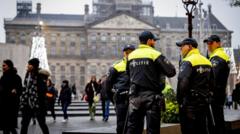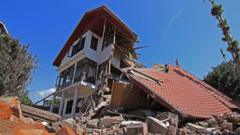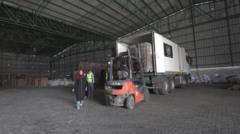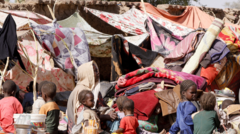In light of recent disturbances following an Israeli football match, community leaders and politicians express concerns over deepening societal rifts and the pressing need for dialogue.
**Tensions Erupt in Amsterdam: The Aftermath of a Football-related Violence**

**Tensions Erupt in Amsterdam: The Aftermath of a Football-related Violence**
Amsterdam grapples with rising societal trepidations in the wake of recent clashes linked to the Israeli-Palestinian conflict.
Recent violence in Amsterdam following an Israeli football match has laid bare underlying tensions within the Dutch capital, prompting urgent calls for dialogue and reconciliation. The clashes emerged as Maccabi Tel Aviv fans were attacked amidst increasing hostilities tied to the ongoing Israeli-Palestinian conflict.
City officials decried the violence as a "volatile mix of antisemitism, hooliganism, and discontent" stemming from the Gaza war. Tensions between Amsterdam's Jewish and Muslim communities have evidently worsened, increasing fears that such incidents could spark further violence. Rabbi Lody van de Kamp likened the situation to a "tinderbox," suggesting that the arrival of 2,000 Israeli football fans had heightened tensions, making conflict almost inevitable.
Events escalated when Maccabi supporters were filmed tearing down a Palestinian flag, provoking public outrage and retaliation calls were made via social media, with some invoking alarming phrases such as "Jew hunt." As a pro-Palestinian protest attempted departure from the Johan Cruyff Arena, violence erupted involving assaults on supporters and a general atmosphere of chaos in the city center.
Mayor Femke Halsema condemned the hostility in chilling historical context, nodding to the infamous Kristallnacht pogrom against Jews in 1938. For many in the Jewish community, the mounting fear of violence was palpable. Esther Voet of the Dutch Jewish Weekly highlighted community members' efforts to provide shelter for those attacked.
In response, the Dutch government has allocated €4.5 million to combat antisemitism and support victims, with Justice Minister David van Weel insisting that Jewish citizens should feel secure in their homeland. Yet, Chanan Hertzberger, chairman of the Central Jewish Committee, warned against merely superficial solutions, attributing rising antisemitic rhetoric to the recent emotional impact of the conflict.
The political ramifications are equally concerning; tensions have deepened between different ethnic groups with calls from far-right politicians for deportation of dual nationals associated with antisemitism. This has led to outrage within the Moroccan community, who feel unjustly blamed for the actions of a few. Nora Achahbar, a Moroccan-born junior minister, resigned after witnessing racist rhetoric during a cabinet meeting, highlighting the strained conversations within the coalition government.
Calls for constructive discussions have grown louder from academics and community leaders, with Rabbi van de Kamp urging against dangerous narratives that could further divide society. As Amsterdam reflects on its identity as a multicultural hub, voices across the community emphasize the necessity of building trust while addressing the tensions that led to such violence.
With the desire for an inclusive dialogue growing, Amsterdam stands at a crossroads reflecting on its values of coexistence and safety for all its inhabitants.
City officials decried the violence as a "volatile mix of antisemitism, hooliganism, and discontent" stemming from the Gaza war. Tensions between Amsterdam's Jewish and Muslim communities have evidently worsened, increasing fears that such incidents could spark further violence. Rabbi Lody van de Kamp likened the situation to a "tinderbox," suggesting that the arrival of 2,000 Israeli football fans had heightened tensions, making conflict almost inevitable.
Events escalated when Maccabi supporters were filmed tearing down a Palestinian flag, provoking public outrage and retaliation calls were made via social media, with some invoking alarming phrases such as "Jew hunt." As a pro-Palestinian protest attempted departure from the Johan Cruyff Arena, violence erupted involving assaults on supporters and a general atmosphere of chaos in the city center.
Mayor Femke Halsema condemned the hostility in chilling historical context, nodding to the infamous Kristallnacht pogrom against Jews in 1938. For many in the Jewish community, the mounting fear of violence was palpable. Esther Voet of the Dutch Jewish Weekly highlighted community members' efforts to provide shelter for those attacked.
In response, the Dutch government has allocated €4.5 million to combat antisemitism and support victims, with Justice Minister David van Weel insisting that Jewish citizens should feel secure in their homeland. Yet, Chanan Hertzberger, chairman of the Central Jewish Committee, warned against merely superficial solutions, attributing rising antisemitic rhetoric to the recent emotional impact of the conflict.
The political ramifications are equally concerning; tensions have deepened between different ethnic groups with calls from far-right politicians for deportation of dual nationals associated with antisemitism. This has led to outrage within the Moroccan community, who feel unjustly blamed for the actions of a few. Nora Achahbar, a Moroccan-born junior minister, resigned after witnessing racist rhetoric during a cabinet meeting, highlighting the strained conversations within the coalition government.
Calls for constructive discussions have grown louder from academics and community leaders, with Rabbi van de Kamp urging against dangerous narratives that could further divide society. As Amsterdam reflects on its identity as a multicultural hub, voices across the community emphasize the necessity of building trust while addressing the tensions that led to such violence.
With the desire for an inclusive dialogue growing, Amsterdam stands at a crossroads reflecting on its values of coexistence and safety for all its inhabitants.




















